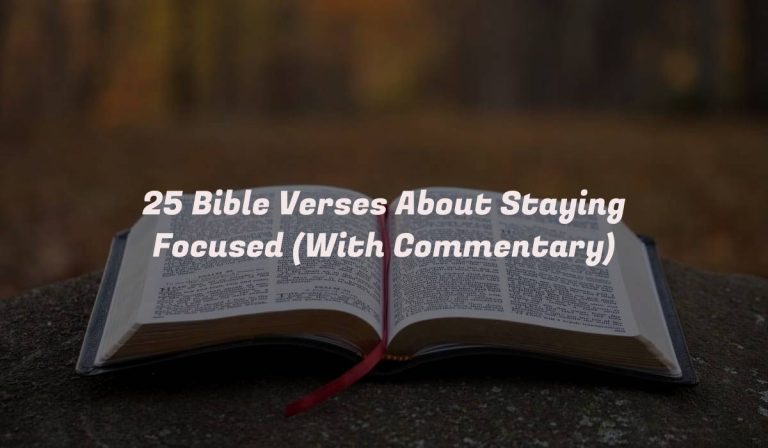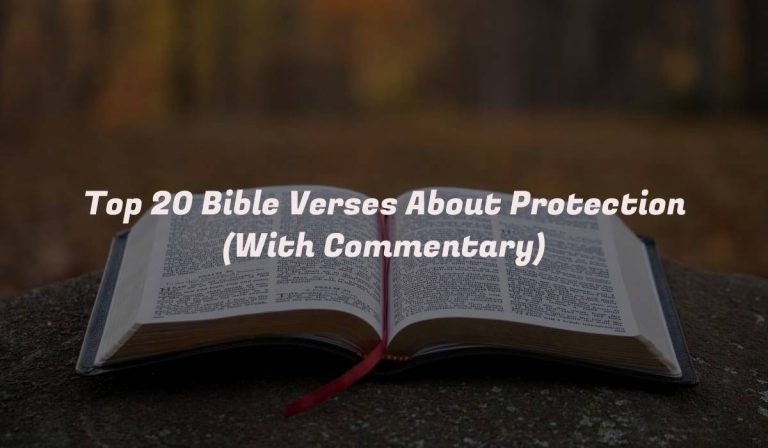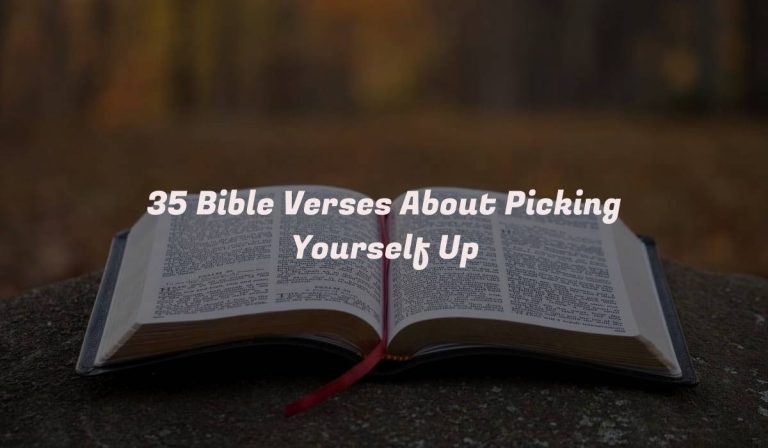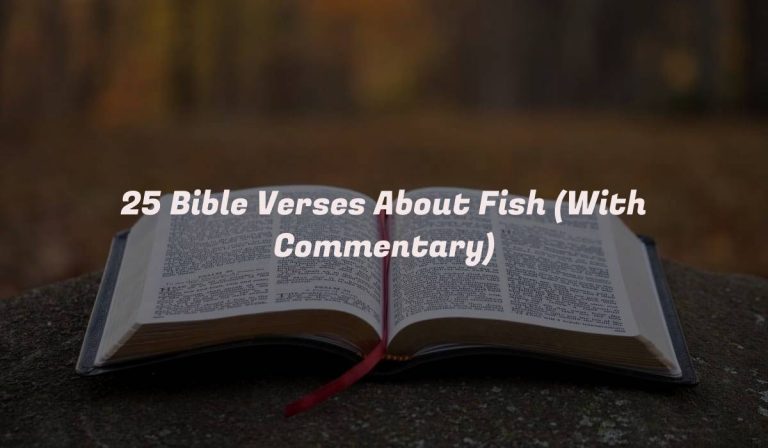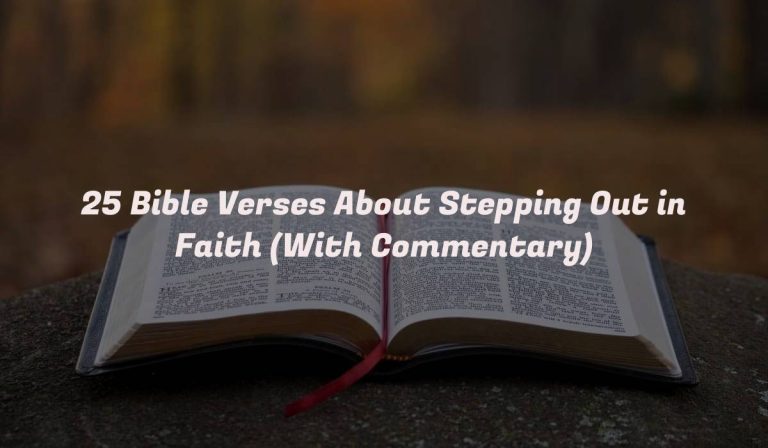25 Bible Verses About Free Will Vs Predestination (With Commentary)
The age-old debate between free will and predestination has puzzled theologians for centuries. While the Bible contains verses that support both perspectives, it ultimately emphasizes the sovereignty of God and the responsibility of humanity. Let’s explore these verses together and contemplate the mystery of divine providence and human choice, seeking a deeper understanding of God’s plan for our lives.
Bible Verses About Free Will Vs Predestination
Deuteronomy 30:19
“This day I call the heavens and the earth as witnesses against you that I have set before you life and death, blessings and curses. Now choose life, so that you and your children may live.”
This verse emphasizes the free will that God has given to humanity. God presents the choice between life and death, blessings and curses, and urges us to choose life for our own well-being and the well-being of future generations.
Joshua 24:15
“But if serving the Lord seems undesirable to you, then choose for yourselves this day whom you will serve, whether the gods your ancestors served beyond the Euphrates or the gods of the Amorites, in whose land you are living. But as for me and my household, we will serve the Lord.”
In this verse, Joshua challenges the Israelites to exercise their free will and make a deliberate choice regarding whom they will serve. He provides them with options, but also declares his personal commitment to serving the Lord.
Proverbs 1:29-30
“Since they hated knowledge and did not choose to fear the Lord, since they would not accept my advice and spurned my rebuke, they will eat the fruit of their ways and be filled with the fruit of their schemes.”
This verse portrays the consequences of rejecting God’s wisdom, guidance, and rebuke. It highlights that individuals have the power to choose whether to accept or reject the Lord and His instructions, even though there are repercussions for their choices.
Matthew 7:13-14
“Enter through the narrow gate. For wide is the gate and broad is the road that leads to destruction, and many enter through it. But small is the gate and narrow the road that leads to life, and only a few find it.”
Jesus presents two distinct paths and gateways: one that leads to destruction and the other to life. The choice is ours to make, either following the crowd or actively seeking the narrow path that leads to eternal life.
John 3:16
“For God so loved the world that he gave his one and only Son, that whoever believes in him shall not perish but have eternal life.”
This iconic verse describes God’s immense love for the world and the salvation He offers through faith in His Son, Jesus Christ. It highlights the universal invitation extended to every individual to believe and receive the gift of eternal life.
John 7:17
“Anyone who chooses to do the will of God will find out whether my teaching comes from God or whether I speak on my own.”
Jesus affirms that those who are willing to align their will with God’s will and sincerely seek Him will come to recognize the divine origin of His teachings. This indicates that individuals have the capacity to choose whether to accept or reject the truth.
Acts 2:21
“And everyone who calls on the name of the Lord will be saved.”
This verse offers a promise of salvation to all who willingly call upon the name of the Lord. It reinforces the belief that salvation is accessible to anyone who chooses to seek God and accept His gift of grace.
Romans 10:9
“If you declare with your mouth, ‘Jesus is Lord,’ and believe in your heart that God raised him from the dead, you will be saved.”
Paul explains that salvation requires a personal confession and belief in Jesus as Lord, which is a choice that individuals must make from their hearts. This verse emphasizes the importance of personal decision-making in the process of salvation.
1 Corinthians 10:13
“No temptation has overtaken you except what is common to mankind. And God is faithful; he will not let you be tempted beyond what you can bear. But when you are tempted, he will also provide a way out so that you can endure it.”
This verse assures believers that even in times of temptation, God will not allow us to be overwhelmed beyond what we can handle. It acknowledges our ability to choose to resist temptation and God’s faithful provision of a way to escape it.
Galatians 5:13
“You, my brothers and sisters, were called to be free. But do not use your freedom to indulge the flesh; rather, serve one another humbly in love.”
Paul reminds believers that they have been called to freedom in Christ. However, it is our responsibility to choose to use that freedom wisely and not use it as a license for indulging in sinful desires. Instead, we are encouraged to serve one another in love.
1 Timothy 2:4
“who wants all people to be saved and to come to a knowledge of the truth.”
Paul expresses God’s desire for the salvation of all people, indicating that it is within His will for individuals to choose to embrace the truth and be saved. This verse affirms the importance of personal decisions in responding to God’s invitation.
Hebrews 3:15
“As has just been said: ‘Today, if you hear his voice, do not harden your hearts as you did in the rebellion.’
This verse serves as a reminder to heed God’s voice and not harden our hearts in rebellion, as the Israelites did in the wilderness. It emphasizes that we have the power to choose whether to respond to God’s calls or resist them.
James 4:7
“Submit yourselves, then, to God. Resist the devil, and he will flee from you.”
James urges believers to submit to God and choose to resist the devil. This verse highlights that we have the freedom to either submit to God’s authority or yield to the temptations and schemes of the enemy.
1 Peter 2:9
“But you are a chosen people, a royal priesthood, a holy nation, God’s special possession, that you may declare the praises of him who called you out of darkness into his wonderful light.”
This verse highlights the identity and purpose of believers as a chosen and holy people called by God. It showcases that each individual has the choice to respond to God’s calling and live a life dedicated to proclaiming His praises.
Revelation 22:17
“The Spirit and the bride say, ‘Come!’ And let the one who hears say, ‘Come!’ Let the one who is thirsty come; and let the one who wishes take the free gift of the water of life.”
This verse extends the invitation for all who are thirsty to come and partake freely of the water of life. It emphasizes that anyone who desires can make the choice to accept the free gift of salvation offered by Jesus Christ.
Ezekiel 18:4
“For everyone belongs to me, the parent as well as the child – both alike belong to me. The one who sins is the one who will die.”
God, through Ezekiel, emphasizes personal accountability and responsibility for one’s own actions. This verse reinforces the idea that individuals have the power to choose righteous or sinful behavior and bear the consequences accordingly.
Matthew 23:37
“Jerusalem, Jerusalem, you who kill the prophets and stone those sent to you, how often I have longed to gather your children together, as a hen gathers her chicks under her wings, and you were not willing.”
In this verse, Jesus expresses His heartfelt desire to gather and protect the people of Jerusalem, but He acknowledges their unwillingness. It reflects the concept of human choice and the consequences it can bear, both individually and corporately.
John 6:44
“No one can come to me unless the Father who sent me draws them, and I will raise them up at the last day.”
This verse reveals that the Father plays an active role in drawing people to Jesus, but it does not negate the fact that individuals still have the choice to respond to His call or reject it. It emphasizes the partnership between divine initiative and human response.
John 12:32
“And I, when I am lifted up from the earth, will draw all people to myself.”
Jesus declares that His crucifixion and exaltation will attract people from all backgrounds to Himself. The word “draw” implies an invitation or attraction, allowing individuals to respond willingly rather than being forced into submission.
Romans 8:29-30
“For those God foreknew he also predestined to be conformed to the image of his Son, that he might be the firstborn among many brothers and sisters. And those he predestined, he also called; those he called, he also justified; those he justified, he also glorified.”
These verses emphasize God’s foreknowledge and predestination regarding the conformity of believers to the image of Christ. However, it is crucial to note that predestination, in this context, does not negate the individual’s freedom to choose to respond to God’s call and be justified.
2 Timothy 2:21
“Those who cleanse themselves from the latter will be instruments for special purposes, made holy, useful to the Master and prepared to do any good work.”
Paul presents the notion that individuals have a role to play in their own purification and consecration. This verse portrays our ability to choose to cleanse ourselves for God’s special purposes, indicating that our responses and actions do matter.
2 Peter 3:9
“The Lord is not slow in keeping his promise, as some understand slowness. Instead, he is patient with you, not wanting anyone to perish, but everyone to come to repentance.”
Peter affirms God’s patience and His desire for all people to come to repentance. This verse underscores the importance of personal decisions and the opportunity for individuals to choose whether or not to respond to God’s call for repentance.
Revelation 3:20
“Here I am! I stand at the door and knock. If anyone hears my voice and opens the door, I will come in and eat with that person, and they with me.”
This verse portrays Jesus as the one who invites individuals to open the door of their hearts and let Him in. It implies that it is our choice to respond to His call and allow Him access to our lives, experiencing intimate fellowship with Him.
Matthew 22:14
“For many are invited, but few are chosen.”
In the parable of the wedding banquet, Jesus speaks of the invitation extended to many, but only a few being chosen. This verse suggests that while an invitation is given to all, the ultimate choice to respond and accept the invitation lies with individuals.
What Does The Bible Say About Free Will Vs Predestination?
When it comes to the question of free will versus predestination, the Bible provides insight, but it does not give a definitive answer that clearly supports one view over the other. Instead, the Bible presents a tension between God’s sovereignty and human responsibility.
On one hand, the Bible emphasizes God’s sovereignty over all things. He is the Creator and Ruler of the universe, and nothing happens outside of His knowledge and control (Psalm 115:3, Isaiah 46:9-10). This suggests that God has a plan and purpose for everything, including our lives. Some passages, such as Romans 8:29-30 and Ephesians 1:4-5, speak of God choosing and predestining individuals before the foundation of the world.
On the other hand, the Bible also emphasizes human responsibility and decision-making. We are repeatedly called upon to make choices, to obey God’s commands, and to seek wisdom and understanding (Deuteronomy 30:19, Joshua 24:15, Proverbs 3:5-6). Throughout Scripture, we see examples of individuals exercising their free will, both in choosing to follow God (Joshua 24:15) and in rebelling against Him (Genesis 3:6, Isaiah 65:2).
Rather than giving us a clear-cut answer, the Bible encourages us to hold both concepts in tension. We are accountable for our choices and actions, as we will be judged based on how we have lived our lives (Romans 14:12, 2 Corinthians 5:10). Simultaneously, the Bible acknowledges God’s sovereignty and His ability to use even our choices and actions to accomplish His purposes (Proverbs 16:9, Romans 8:28).
This tension can be challenging to understand fully, and different individuals and Christian traditions interpret it differently. Some lean more towards predestination, emphasizing God’s sovereignty and the belief that He has predetermined everything. Others emphasize free will and the responsibility of individuals to make their own choices.
Ultimately, rather than trying to fully reconcile these perspectives, we should seek to humbly trust and submit to God, recognizing and honoring both His sovereignty and our responsibility. We should strive to make choices aligned with God’s will, seeking His wisdom, and relying on His guidance (Proverbs 3:5-6). And in doing so, we can have confidence that God is working out His perfect plan, whether we fully understand it or not.


